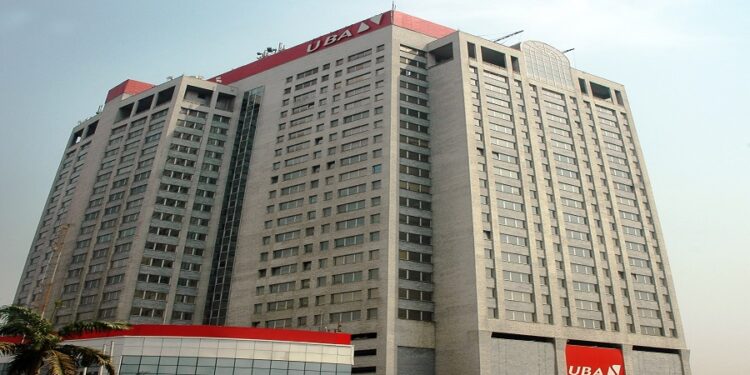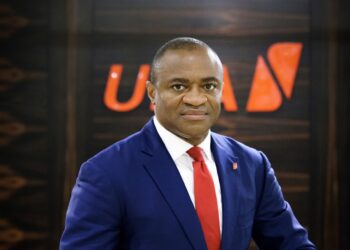United Bank for Africa (UBA) Plc says that it intends to achieve a 20% growth in deposits for the entire year of 2024.
Additionally, the group has stated its commitment to raising the necessary capital component in accordance with directives from the Central Bank of Nigeria.(CBN) at the appropriate time.
The capital raise initiative aligns with the efforts of other banks to bolster capital reserves in order to meet new regulatory targets.
The CBN, last month, announced minimum capital requirements for banks to strengthen the country’s financial system and enable lenders to play a bigger role in boosting economic growth.
The management of the bank made the disclosure at the full-year 2023 investor conference call presentation where it provided insights into the bank’s remarkable end-of-year 2023 financial results.
- “We’re guiding a full-year deposit growth of about 20%, loan growth of about 20%, cost of risk of about 3.8%, non-performing loan ratio of about 4.5%, return on average equity of about 30%, return on assets of about 3%, capital adequacy ratio of about 30%, cost to income ratio at about 45%, and net interest margins will be about 7.5%,” it noted.
According to the Group Managing Director and Chief Executive Officer of UBA Plc, Mr. Oliver Alawuba, the bank will, in due course, raise the required component of capital in line with the CBN directives.
- “I want to reiterate that United Bank for Africa is very well capitalized with shareholders’ funds in excess of N2 trillion. We wil,l in due course, raise the required component of capital in line with the Central Bank of Nigeria directives,” he said.
Increase in net interest income
Alawuba noted that against a backdrop of challenging and volatile geopolitical and economic conditions, the bank delivered another year of record earnings.
- “Our gross earnings and profit before tax reached their highest levels in our history. Gross earnings grew year-on-year (y-o-y) by 143.3% to N2.1 trillion and our profit before tax increased by 277.2% to N757.7 billion, asserting UBA’s position as a leading financial institution,” he said.
According to Alawuba, the growth was fueled by a significant increase in net interest income, due to a combination of a strong expansion in the loan portfolio, higher net interest margins, and a substantial contribution from foreign exchange operations.
He said the FX operations benefited from increased business activity and improved profit margins.
Alawuba added that operating costs increased by 69%, driven significantly by the substantial impact of an over 100% increase attributable to the bank’s foreign operations and FX currency-denominated expenses in domestic operations.
Notwithstanding the adverse macroeconomic conditions, he said the fundamental strength of underlying asset quality persists, as reflected in a Non-Performing Loan (NPL) ratio of 5.85%.
Executive Director, Finance and Risk Management, Ugo Nwaghodoh, in his presentations, noted that operating income rose 168% to N1.6 trillion.
Devaluation in some markets
According to him, given the inflation that has been seen globally and the devaluation in some markets, operating expenses rose 78% from N350 billion in the 2022 full year to N592 billion at the end of the 2023 full year.
Nwaghodoh stated that in spite of the headwinds, profit before tax (PBT) rose N557 billion from N201 billion in the full year 2022 to N758 billion at the end of the full year 2023. SimilarlY, profit after tax (PAT) was up to N608 billion from N170 billion same time last year. Total assets grew 90% to N20.7 trillion. Deposits also moved in the same trajectory, growing 93% to N17.4 trillion.
- “I must say at this point that the valuation of the Naira, which is our reporting currency, is pivotal to some of the growth that we’ve recorded on some of these balance sheet lines. Loans and advances are also up 61% to N5.5 trillion.
- Real growth on loans and advances was 15% and real growth on deposits was 56%. Shareholders’ funds now stand at N2.1 trillion from N922 billion in the correcponding period. .
- We saw significant moderation in our cost-to-income ratio, from 59% to 37.2%. And cost of risk also rose from 0.63% to 3.09%,” he said.
Credit risk
He stated that the rise in the cost of risk was largely on the back of the fact that the lender feels that the portfolio impairment that it should carry needs to reflect the weakening in a number of economies and the impact of devaluation and removal of fuel subsidy, among others on customers’ businesses.
- “And that has led to, for us, potential heightening of credit risk, which has meant that we needed to reserve much more for portfolio impairment. So, we expect that there might be some defaults somewhere down the lane, and we are reflecting all of that in the impairment numbers.
- Of course, the return on equity closed at 41.1%, and the capital adequacy ratio at 32.6%. The NPL slipped from 2.95% to 5.85% largely because of some major classifications in some of the markets like Nigeria, Cameroon, and Congo DRC.
- That’s why we have that at 5.85%. Included in the profits for the 2023 full year is the valuation gain coming from the valuation of our derivative portfolio, which was about N457 billion,” he said.






















